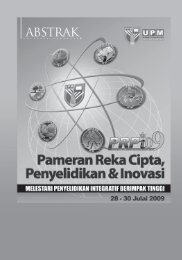BUKU ABSTRAK - Universiti Putra Malaysia
BUKU ABSTRAK - Universiti Putra Malaysia
BUKU ABSTRAK - Universiti Putra Malaysia
You also want an ePaper? Increase the reach of your titles
YUMPU automatically turns print PDFs into web optimized ePapers that Google loves.
Social Sciences<br />
Understanding Psychosocial Behavioural Patterns: Factors and Problems in<br />
School to University Transition<br />
Prof. Dr. Habibah Elias<br />
Rahil Mahyuddin and Nooreen Noordin<br />
Faculty of Educational Studies, University <strong>Putra</strong> <strong>Malaysia</strong>,<br />
43400 UPM Serdang, Selangor, <strong>Malaysia</strong>.<br />
+603-8946 8208; hbe@educ.upm.edu<br />
Psychosocial profiling can help deduce an individual’s profile. It can include various behaviours, preferences,<br />
personal traits and special talents. Profiles deduced from background information have the potential to surpass<br />
conventional psychological testing methods as they consider more factors than what people say. Based on this<br />
premise, this study aims to identify levels of achievement motivation, self-esteem, emotional intelligence, and<br />
self-efficacy among students in local and private universities. The study examines the number of items that<br />
reflects <strong>Malaysia</strong>n university students’ behaviour profile based on psychosocial variables such as adjustment,<br />
self-efficacy, achievement motivation, self-esteem, emotional intelligence, and academic adjustment. By looking<br />
for patterns in the available data and inferring possible outcomes, educators and the authorities concerned will<br />
be able to determine the relationship between the psychosocial variables mentioned with university students’<br />
academic achievement. In addition, findings of the study will help to determine the relationship between the<br />
psychosocial variables mentioned with university students’ level of adjustment. The implications are discussed in<br />
terms of teaching and learning in tertiary education.<br />
Keywords: Psychosocial profile, achievement motivation, self-esteem, emotional intelligence, self-efficacy, academic<br />
achievement, adjustment<br />
Complexity Advantage of MSC <strong>Malaysia</strong> for Transformation<br />
Prof. Dr. Han Chun Kwong<br />
Faculty of Economics and Management, University <strong>Putra</strong> <strong>Malaysia</strong>,<br />
43400 UPM Serdang, Selangor, <strong>Malaysia</strong>.<br />
+603-8946 7717; han@putra.upm.edu.my<br />
The Multimedia Super Corridor (MSC <strong>Malaysia</strong>) has been the key engine for knowledge and information<br />
communications technology (K+ICT) development in <strong>Malaysia</strong>. Given the increasingly dynamic and complex<br />
national and international environment which the MSC <strong>Malaysia</strong> has been undergoing, major changes to its<br />
approaches, policies and practices have occurred over the past decade. Academicians, consultants and the press<br />
have been advocating and debating about the impacts and contributions of the national project. But what is<br />
required is a more sophisticated lens for seeing and explaining what had happened and prescribing positively<br />
what should happen. We apply a combination of concepts from complexity, critical and structuration theories, to<br />
provide a better description of the complex organisational, social and technological realities of the MSC <strong>Malaysia</strong>.<br />
Next, we develop critical accounts on policy and practice. Finally we elucidate on the potential to inform and<br />
improve practice, and conclude positively that the MSC <strong>Malaysia</strong> and the government could apply and fruitfully<br />
translate the complexity advantage to greatly enhance the next level of successes and impacts of MSC <strong>Malaysia</strong><br />
in driving the transformation to a developed nation.<br />
Keywords: Complexity theory, information communications technology, knowledge for understanding and action, critical<br />
theory, structuration theory<br />
178



